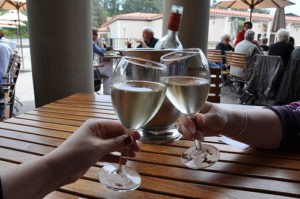 Did that title get your attention? I hoped so.
Did that title get your attention? I hoped so.
It’s almost time for another Jewish holiday! I bet you didn’t even know about this one. And yes, it involves four cups of wine. Just like Passover. But better. Because it’s winter. And now, more than in April, the Minnesota frozen chosen need a little bit of wine to warm our bodies. In moderation, of course.
The holiday I’m talking about is Tu Bishvat. And it isn’t until Wednesday, January 19th but I’m giving you a little bit of lead time so you can throw a party on Wednesday night and celebrate it the way they did Tsfat in the 1600s, except with a greater variety of kosher wine options.
You may (or may not) remember Tu Bishvat from Hebrew school. There’s something about fruit in the holiday, right? Dates and figs? Maybe nuts? I can see you scratching your head trying to think back – ooh, ooh you shout – this is the holiday where we get those green envelopes in the mail asking us to give money to plant trees in Israel!
Yes. All that is right. But there is so much more to this holiday. More fun.
And when it’s 30 degrees below, and the streets are slushed out with snow, we need a little extra fun.
Tu Bishvat is actually a mini-Passover. The way it was celebrated in the ancient (and totally stunningly beautiful – you should go there it’s so beautiful, especially on Shabbos, but I digress) city of Tsfat way back when was actually as a Seder. One cup of wine. Some fruit. Nuts. Prayer. Repeat. Four cups total folks. Yes, Jews know how to party.
But what does this holiday mean to us today? And how can we make it awesome and relevant – and still keep the four cups of wine?
Tu Bishvat is about rebirth. About new lives in our world, and new energy in the ground. You see, right now in Israel the winter rains (yes, I said rain, not snow, for most of the country, sigh) are just about stopping. And everything is starting to grow. We have to imagine that, living in Minnesota, of course. But it’s a beautiful, warm thought. Ah, sun. Ah, warmth….
But back to reality.
Tu Bishvat is about celebrating the environment and everything around us.
It’s about celebrating Israel.
It’s about taking a moment to say thanks for what we take for granted. Trees. Food. Life.
So this year, celebrate with a Tu Bishvat seder (find some sample Tu Bishvat seders listed here). Or a Tu Bishvat Drinking Game.
Or just celebrate life.
In whatever way you choose to.
Say the shehechiyanu blessing thanking G-d, or your higher power, or whoever blesses you in life, for all the things you have. Have your friends over. Break open a few bottles of wine. Or sparkling apple juice (especially if you’re one of those lucky ladies who is celebrating another kind of new life this season).
Ba-ruch A-tah Ado-noi E-lo-hei-nu Me-lech Ha-olam
She-heh-che-yah-nu Ve-ki-yi-ma-nu Ve-he-gi-a-nu Laz-man Ha-zeh.
Blessed are You, L-rd our G-d, King of the universe, who has kept us alive, and has preserved us, and enabled us to reach this season.
Sometimes we need a reason to celebrate. To pull us out of the everyday.
Jewish holidays do that. They remind us that there is something greater than us. That we are a part of a history, a culture, an identity that is more than drive to work, work all day, eat, watch the TV, sleep.
Raise a glass and give thanks.
(Photo: vmiramontes)




Hey, Leora,
Is Erev Tu Bishvat next Thursday night or Wednesday night?
~Jenna
That custom of drinking actually came from Kabbalah in the 17th century. The concept was to have a Tu Bishvat seder in which the fruits and trees of the Land of Israel were given symbolic meaning. The main idea was that eating ten specific fruits and drinking four cups of wine in a specific order while reciting the appropriate blessings would bring human beings, and the world, closer to spiritual perfection.
Drinking for this holiday is great. Just remember why.
Thanks for the comment Aaron. I totally agree that the custom of drinking came from the kabbalists in Tsfat in the 17th century (see paragraph 2). Here’s the link from the top of the article, which has more information about the mystical traditions and connections to the holiday. The question is – do you really think drinking the wine and eating the fruit cane bring us to spiritual perfection? Sounds a bit hippie to me… http://www.myjewishlearning.com/holidays/Jewish_Holidays/Tu_Bishvat/Ideas_and_Beliefs/Kabbalah.shtml